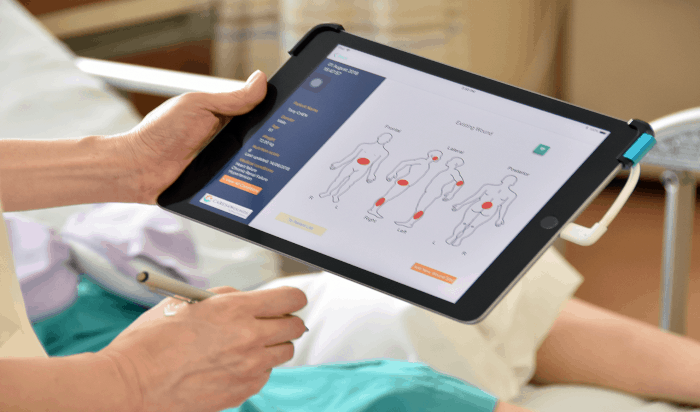Wound care has begun utilizing increasingly advanced technology that is mutually beneficial to wound care experts and patients alike. Artificial Intelligence (AI) is rapidly progressing in utilization within the healthcare industry as a whole. Physicians are being given the opportunity to develop and use solutions that utilize AI in the process of diagnosing diseases and determining a treatment that will guide their patients down the pathway to healing.
Color duplex ultrasound scanning is a technological imaging tool that enables wound care experts to have a better accuracy when making a confirmation that a wound exists and giving the patient a proper diagnosis. AI applications are being used to analyze radiology images for wound care purposes. AI-backed programs used as cognitive assistants are assisting wound care physicians to diagnose injuries more efficiently through the consideration of critical metrics such as bacterial burden, protease, and levels of exudate. AI is a beneficial tool that can be leveraged to assess information from a patient’s EMR and examine said files through a clinical lens with historical data. Clinicians are supported by AI through medical comparisons, risk assessments of treatment methods, and clinical outcome predictions. When compounded, all of these attributes create a powerful team of capabilities that help with the identification of optimal individual treatment plans.
Wound care solutions that are AI-based can be an extreme benefit for patients with persistently chronic wounds. These solutions capture the majority of the data from face-to-face consultations either at facilities or in patient’s homes. For patients that are seen remotely due to their residence being geographically rural this is incredibly convenient since the long travel time to and from wound care facilities can be avoided. AI-powered devices and applications are able to provide remote monitoring for these patients. This gives the providers the opportunity to follow up care with the data and insight needed to provide expert care and guide the patient toward a positive outcome. Virtual healthcare assistants created through Artificial Intelligence are making treatment increasingly accessible for patients by banishing location and timing constraints. Individualized custom solutions are being administered to wound care patients each day, bringing about a growth in the wound care market and longevity to patients with chronic wounds.
When AI is paired with technology that is wearable by the patient, AI is able to monitor and evaluate the patient’s progress during treatment. The wound care industry is evolving into a delivery system for improved quality of life for many patients with chronic wounds. Diabetic amputations are decreasing and improved outcomes for all wound patients are on the incline. With AI, machine learning, and a new outlook on bedside manner that focuses on treating the patient as a person and not as wound; patients are motivated to work together with their teams of physicians and healing is coming at a faster pace. The chances of wounds returning are decreasing. As the methods of treatment and the technology continue to develop and new dressings are discovered, the skills and abilities of the experts in the field become sharpened and honed which equates to freedom for patients.
Throughout the year, our writers feature fresh, in-depth, and relevant information for our audience of 40,000+ healthcare leaders and professionals. As a healthcare business publication, we cover and cherish our relationship with the entire health care industry including administrators, nurses, physicians, physical therapists, pharmacists, and more. We cover a broad spectrum from hospitals to medical offices to outpatient services to eye surgery centers to university settings. We focus on rehabilitation, nursing homes, home care, hospice as well as men’s health, women’s heath, and pediatrics.








